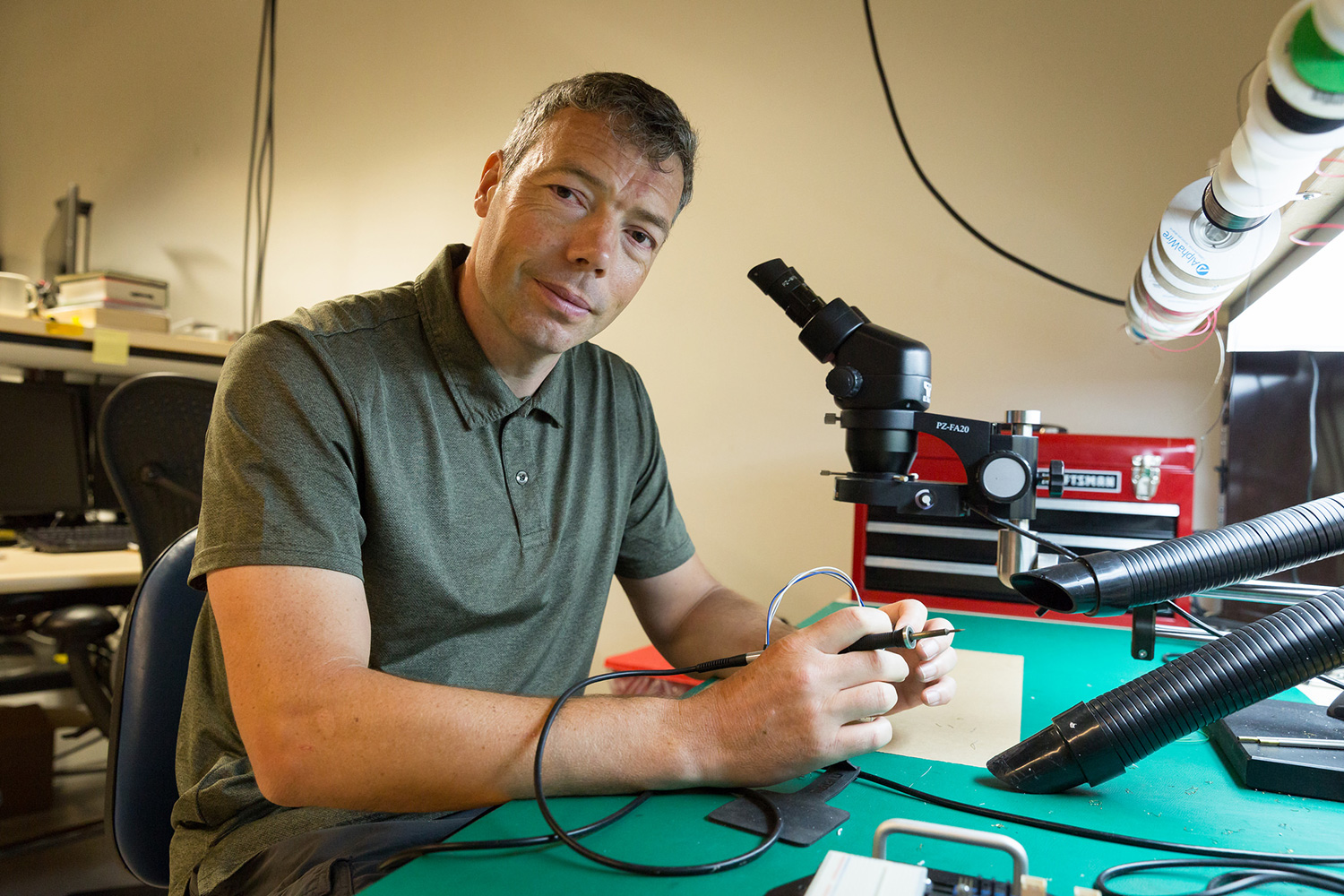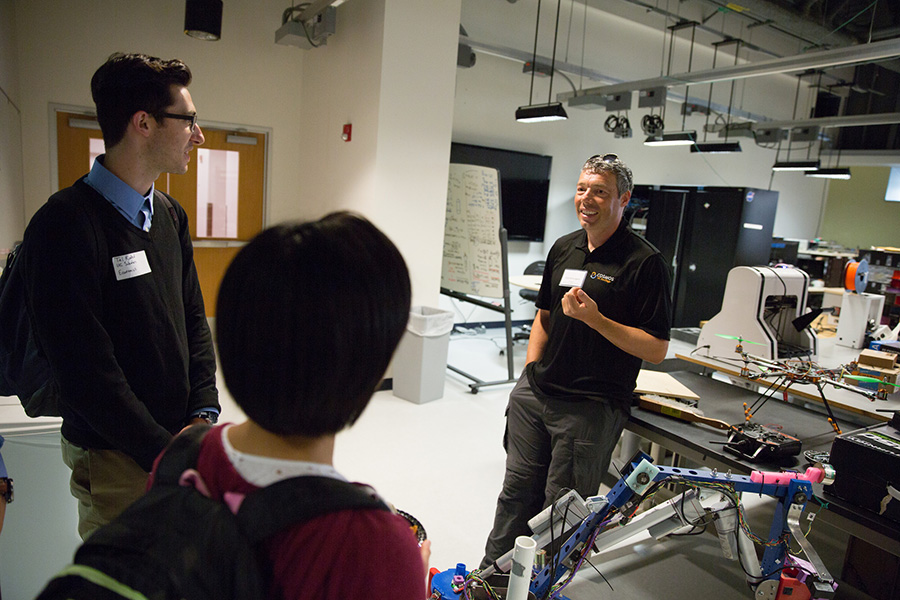New ECE Faculty Hire Awarded Fulbright Scholarship to Bring Breadboards to Bishkek
Published Date
By:
- Tiffany Fox
Share This:
Article Content

Curt Schurgers is the newest faculty hire in the UC San Diego Department of Electrical and Computer Engineering. Photos by Alex Matthews/Qualcomm Institute
Just after his “Intro to Circuits” students wrap up their final exams next quarter, Curt Schurgers -- the newest faculty hire in UC San Diego’s Electrical and Computer Engineering department -- will pack up his electronic breadboards and head clear across the world to the Kyrgyz Republic.
Before applying for his newly appointed associate professor position, Schurgers had also applied for a Fulbright U.S. Scholar award to teach project-based computer science classes at International Ataturk Alatoo University in Bishkek, the capital city of what is also commonly known as Kyrgyzstan. He was fortunate enough to receive both opportunities, which will give him a chance to bring his signature brand of hands-on learning to a country with a marked need for instruction in engineering and computer science.
Schurgers, who estimates he’s traveled to more than 70 countries, says that he is “super excited” about Kyrgyzstan because “it’s so completely different -- it’s an interesting mix of cultures and it’s also a country that’s not your usual tourist destination. I’ve always found the types of people who live in those places to be so friendly.”
“Change is always good,” he adds, “change and challenge. I don’t like doing the same thing over and over again.”
The courses he’ll be teaching abroad will incorporate Arduino and Raspberry Pi microcontrollers in a way that is “similar in philosophy” to that of the programs and courses he oversees at UC San Diego, including the Qualcomm Institute prototyping lab (where he is director), Engineers for Exploration, COSMOS (California State Summer School for Mathematics and Science) and a number of ECE courses he has previously taught as a lecturer. The guiding principal of that philosophy: Help small groups of students come up with a common goal and then give them the tools (whether programming instruction or soldering irons) to make their visions real.
“I like to make sure students enjoy what they’re learning,” says Schurgers. “You have to get them excited about stuff because these days they can learn everything on the Internet. If you make it boring and then force it on them, they won’t be intrinsically motivated to create something.”
In the academic world it’s known as “active learning” or the opposite of “the sage on the stage.” “Since the students have access to online videos and textbooks,” he notes, “you can use the class time for something else, like reinforcing concepts and addressing myths or doing peer learning.”

Schurgers answers questions from students during a tour of the QI Prototyping Lab.
"Curt really takes to heart several of the core tenets of UCSD's engineering program, from creating innovative instructional methods to inspiring and educating tomorrow's technology leaders. He has already proven himself to be a popular instructor at UC San Diego and we are thrilled to have him join the rest of the faculty in the Department of Electrical and Computer Engineering."
But even with an active learning approach, engineering remains a difficult academic discipline, and Schurgers says one of his greatest challenges is holding students accountable for their work while also encouraging them to stick with it when the going gets tough.
“It’s difficult when you get students who don’t know the basics, but when you’re grading them you have to be fair,” he says. “You always wonder, as a teacher, if they sometimes fail because of you, or because of them, but it’s probably a combination of both.”
Schurgers recalls a time when this collaborative approach came into play with one particular student in his Introduction to Active Circuits class (ECE 102) -- a course considered by the undergraduates to be among the most difficult the department offers.
“This student had to take the course for the third time after failing to pass it twice, and he would come to office hours with me all the time. He really wanted to pass the class, and he finally did, although he didn’t get a good grade. But when I saw him after a few more quarters had passed, he said he was so happy that it had finally clicked — he had gone from the black magic of purely plugging in numbers and hoping that he had picked the right equation to the ‘aha’ moment where he finally understood the basics of engineering.”
Schurgers’ first challenge at UC San Diego will be to use the active learning approach in Introduction to Analog Design (ECE 35), a theoretical course that the students enroll in after “getting their feet wet” in a project-based course in engineering. Through his collaboration with the UC San Diego Center for Engaged Teaching (under a grant from the Course Development and Instructional Improvement Program) Schurgers will study how to design the course — not an easy feat given the challenging subject matter and the relative inexperience of the students.
Meanwhile Schurgers will also be pondering the shifts he might need to make while in Bishkek, an area of the world known for its protein-rich diet (with horse meat being a major food source), mountainous terrain and nomadic way of life.
But he says mainly what he feels right now is a sense of “wonderment.”
“It’s interesting to look back at the path you’ve taken and wonder if you would have gotten here any other way. Where I am right now in life is not something I could have ever predicted.”
Share This:
You May Also Like
Stay in the Know
Keep up with all the latest from UC San Diego. Subscribe to the newsletter today.



